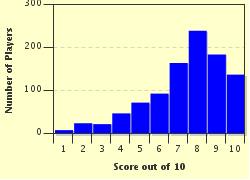Quiz Answer Key and Fun Facts
1. My first chapter is on Serbia as it changed hands between great powers in the 1700s. When the Ottoman Empire ceded Belgrade Pashalik to the Habsburg Empire in 1718, what had a major impact on the life of the average person?
2. My second chapter concerns the European Enlightenment, the movement toward intellectual development in the North Atlantic during the eighteenth century. Which of these was NOT a major Enlightenment thinker?
3. Chapter three deals with nationalism, the building of common, usually ethnic, national identity, often in regions that had long been under foreign control or oppression. Which of these is NOT a common characteristic of nationalism?
4. Chapter four talks about American history, particularly the cultural effect of tuberculosis (TB) in New England. TB was an especially feared disease for its protracted suffering - the afflicted, often in the prime of life, would lose their strength, bit by bit, usually while afflicted with a hacking, "graveyard" cough. A sick person might persist in a miserable condition for years. Also frightening was that the disease, now known to be caused by bacteria, seemed to run in families, so when one member sickened it heavily foreshadowed doom for the rest. By what name was tuberculosis (along with other diseases with similar symptoms) commonly known?
5. Chapter five is on Victorian Britain and its relationship with the world. The later 1800s were a time of great expansion for the British Empire, as the use of English around the world today attests. Which of these was NOT under British rule during the period?
6. My sixth chapter is on East Africa, especially Kenya, and the growing discontent with British imperialism through the twentieth century. What paramilitary brotherhood was dedicated to anti-British activities in Kenya?
7. The seventh chapter of my nascent tome discusses the Gypsies since World War II. The Gypsy Holocaust, which saw the deaths of an estimated 275,000 people, has paled in discussions of world genocides before the better-known fascist campaigns against the Jews, and this abomination has largely been forgotten. Which of these was not a concentration camp for Gypsies (along, at times, with others) during the Holocaust?
8. Chapter the eighth takes up the twentieth century phenomenon of rural development, to the extent that rural areas, once very distinct from cities even within the same nation-state, have grown to resemble and identify with more metropolitan areas in terms of culture, education, and availability of services. My inquiry concerns rural development in the state of Tlaxcala. Where is Tlaxcala?
9. Chapter nine examines the economic plight and cultural challenge of the Hmong, a unique, rural nationality displaced by the Communist/anti-Communist wars in Asia from World War II to the 1970s. Which of these countries would be *least* associated with the Hmong?
10. My final chapter (number eleven - chapter ten is actually kind of scary) concerns the history of MY lifetime: the North Atlantic since the 1970s. The prevailing cultural and intellectual currents of this period have stressed the questioning of traditional values and assumptions on matters of race, gender, religion, and values. In essence, whereas someone could comfortably point to white, middle-to-working class nuclear families as a cultural "mainstream" without much challenge fifty years ago, many (if not most) commentators today would question rather or not there IS a mainstream of any sort in the twenty-first century. What term has been widely applied to this type of thought?
Source: Author
stuthehistoryguy
This quiz was reviewed by FunTrivia editor
bloomsby before going online.
Any errors found in FunTrivia content are routinely corrected through our feedback system.

